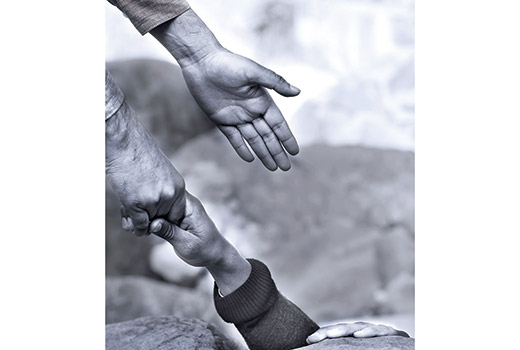Substance abuse takes many forms. Whether a person is struggling with prescription drugs, illicit drugs, alcohol or tobacco, the toll on the user and those around him or her is clear and often devastating.
Millions of people tell of the total loss of control of their lives they experienced through substance abuse. Around 20 percent of the U.S. population has abused prescription drugs. The sense many have that these are safe because they are legal has led millions to ruin. Prescription drug abuse has become the nation’s fastest-growing drug abuse problem, killing more people annually than cocaine and heroin combined. Illicit drug abuse destroys users even more quickly.
The downward spiral into addiction and all its personal and social costs has destroyed millions of lives. Eight percent of the U.S. population 12 years of age or older have used illicit drugs in the past 30 days. While most people are aware of the devastation of such drugs as cocaine and heroin, they are woefully misguided about the dangers of marijuana. Each year, more teens enter addiction treatment with a primary diagnosis of marijuana dependence than all other illegal drugs combined. Illicit drugs are stealing the lives of our youth before they even have a chance to get started.
Then there are the more socially acceptable drugs, alcohol and tobacco. Alcohol is a brutal killer and life destroyer. More than half of all adults have a family history of alcoholism or problem drinking, and more than 7 million children live in a household where at least one parent is dependent or has abused alcohol. Eighty-eight thousand deaths are attributed every year to excessive alcohol use. It is the third leading lifestyle cause of death in the U.S.
Meanwhile, the truly silent killer among us is tobacco. Tobacco use remains the single largest preventable cause of death and disease in the United States. Cigarette smoking kills more than 480,000 Americans each year, with more than 41,000 of these deaths from exposure to secondhand smoke.
The Bible is clear in its counsel regarding substance abuse. The Apostle Paul declared, “I will not be mastered by anything” (1 Corinthians 6:12). Substance abuse interferes with every aspect of our lives. It renders us incapable of giving ourselves fully in service to God and others. We must rid ourselves of these spiritual shackles, and we must look for ways to help those we love as well. Do you know someone struggling with substance abuse? Here are some suggested ways to help:
1. Pray for your friend. God is more powerful than any addiction and can break through the severest addiction.
2. Share God’s love with your friend. Many people turn to addictive substances to mask emotional or spiritual pain. The knowledge of God’s love, acceptance and forgiveness in Christ can help your friend gain healing in these areas and break one of the driving factors in addiction.
3. Share your concern with your friend. Tell him you’ve noticed that he hasn’t been the same lately and ask if he is struggling with something in his life. This is a less confrontational approach that might prevent your friend from going immediately on the defensive. If this fails, you may need a more direct approach. If so, consider including family, friends, pastors and professionals in an intervention plan to confront your friend with the truth of his need. Make sure the intervention has recovery in mind and not merely confrontation and accusation.
4. Don’t facilitate your friend’s addiction. Your friend may ask you for money or other means to support his addiction. You must share in love that you cannot help him destroy himself.
5. Encourage your friend to seek professional help. Addiction is often a very complex illness, requiring doctors, counselors and support groups. There are many Christian services and support groups that specialize in helping people overcome addictions of all kinds. Offer to go with your friend. There are also online resources, including help with quitting smoking.
6. Help your friend find alternative activities. These can help him break away from friends or places that reinforce his addiction.
7. Join a support group for yourself. Addiction can be a difficult thing for someone to overcome. There will be many setbacks. You will need the support of others to help you stay encouraged.
8. Keep yourself spiritually strong. Walking with someone through an addiction can be extremely demanding. You need to make sure you spend enough time with God and godly Christian friends so you have the spiritual and emotional strength to work with your friend through the long process of recovery.
9. Be prepared to release your friend. You are not ultimately responsible for your friend’s recovery. The cravings of addiction can be overwhelming. The person struggling with it must want to be freed from it and willing to work with you. At some point, you may have to tell your friend you have exhausted all your means of help and you cannot continue. Make sure you point him back to God and other sources of help, and offer to come back alongside your friend if he decides he really wants to be freed from his addiction.
10. Never stop praying for your friend, regardless of how your efforts turn out.
Jesus told us that “with God all things are possible” (Matthew 19:26). Whether you are struggling with substance abuse or you know someone who is, God is greater. With his help, freedom from substance abuse is possible. You may be the best chance your friend has to be set free from something destroying his or her life and hurting many others, including you. May you find, in God and the Gospel, the source of healing and help for yourself or those you love.
— Barrett Duke has served in the Washington office of the Southern Baptist Ethics and Religious Liberty Commission as vice president for public policy and research since 2003. This piece first appeared at ERLC.com.

